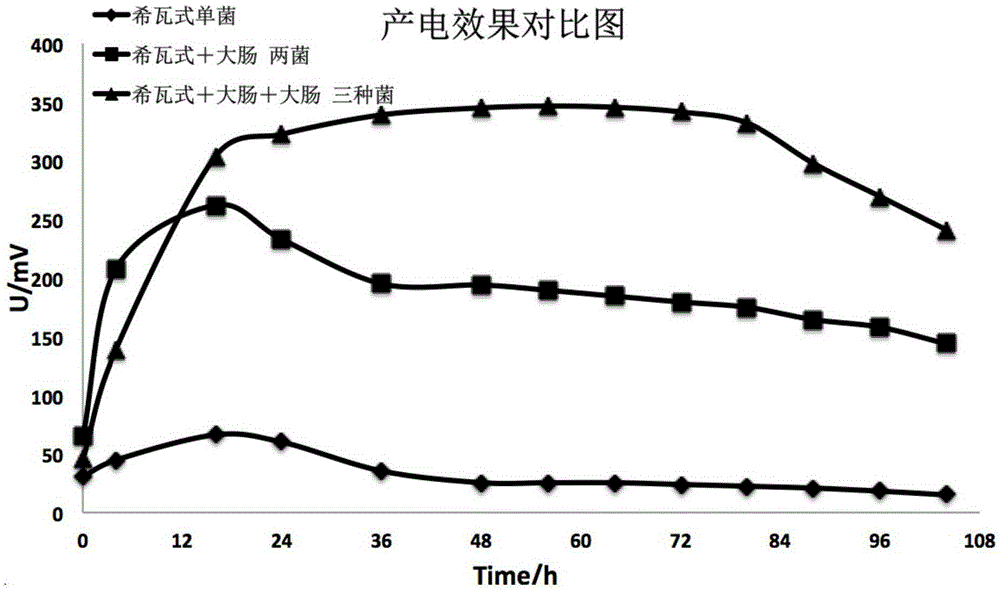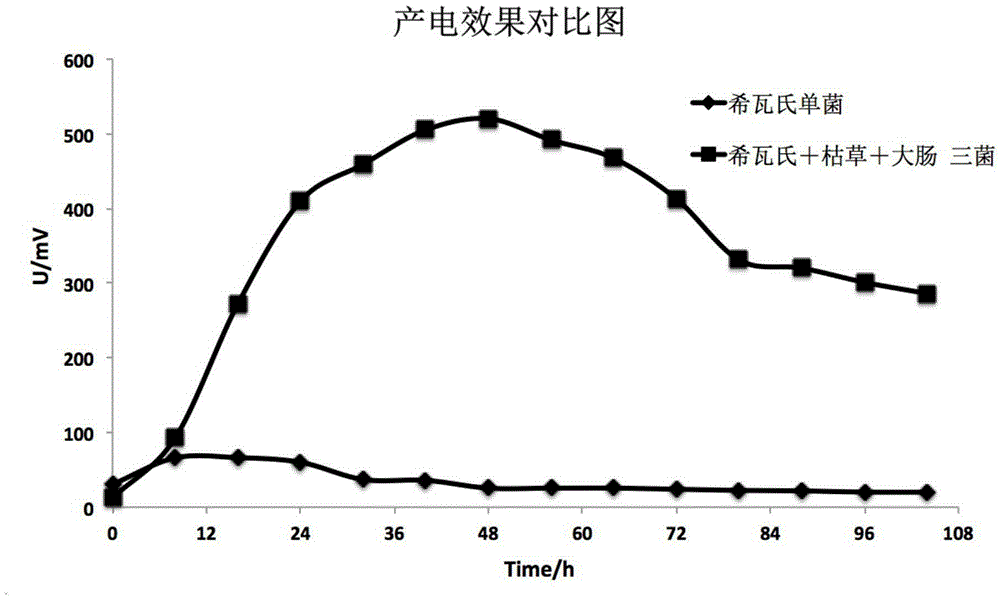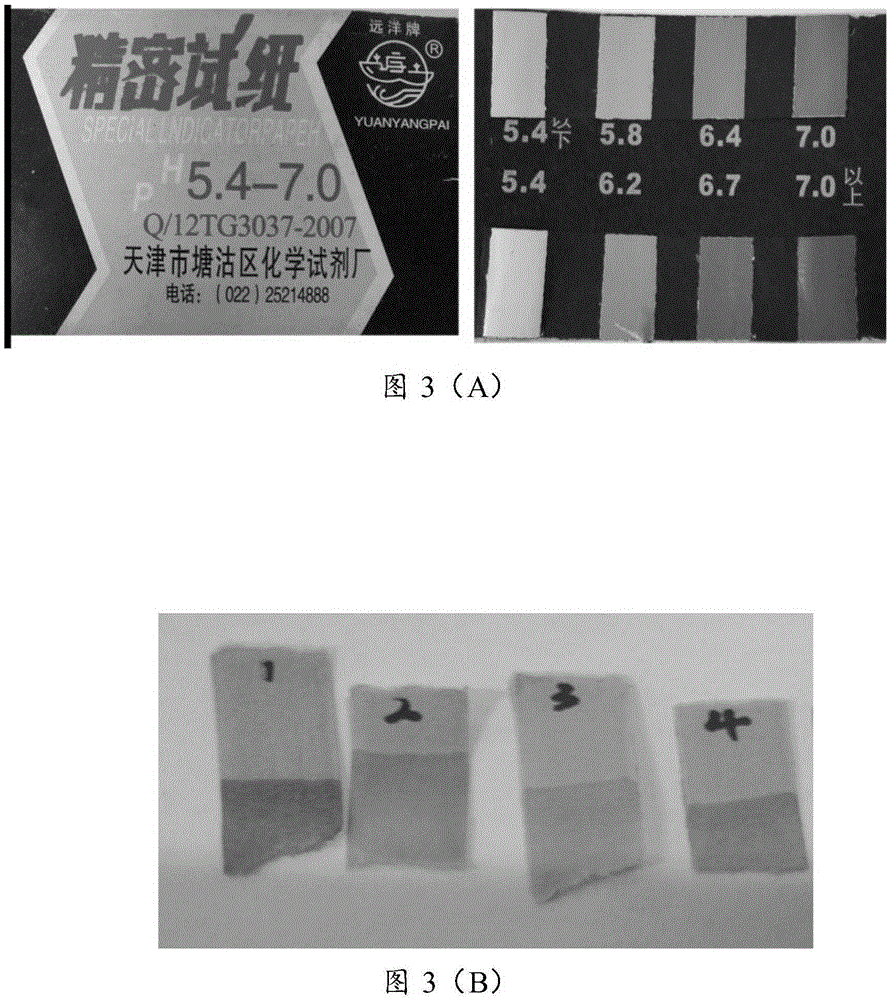Mixed flora and purpose thereof, microbial electrogenesis system containing mixed flora, and microbial fuel cell
A technology of mixed flora and microorganisms, applied in biochemical fuel cells, microorganisms, methods based on microorganisms, etc., can solve the problems of complex system, poor system stability and repeatability, high cost, etc., and achieve the goal of simple system and enhanced electron transfer efficiency Effect
- Summary
- Abstract
- Description
- Claims
- Application Information
AI Technical Summary
Problems solved by technology
Method used
Image
Examples
Embodiment 1
[0062] Embodiment 1 mixed flora
[0063] Construction of Bacillus subtilis with high riboflavin production: Through genetic manipulation, the prs and ywlF genes in Bacillus subtilis were overexpressed, and the Pur operon and PurR regulatory genes (glyA, guaC, pbuG, xpt-pbuX, yqhZ-folD, and pbuO).
[0064] Construct Escherichia coli that produces small molecular acids using five-carbon sugars and six-carbon sugars as carbon sources: use λ-Red homologous recombination technology to knock out the pflB gene in Escherichia coli, and then introduce the ldhE gene (lactic acid-producing gene, derived from Lactobacillus, Synthesized by GENWIZE company), the method is: by EcoRI and PstI digestion, connected to the pSB1C plasmid, and then the plasmid connected with the ldhE gene is introduced into the above-mentioned Escherichia coli with the pflB gene knocked out, and the chloramphenicol resistance is screened, and the correct transformants. Take the constructed Bacillus subtilis with...
Embodiment 2
[0067] Embodiment 2 mixed flora
[0068] Construction of Bacillus subtilis with high riboflavin production: Through genetic manipulation, the prs and ywlF genes in Bacillus subtilis were overexpressed, and the Pur operon and PurR regulatory genes (glyA, guaC, pbuG, xpt-pbuX, yqhZ-folD, and pbuO).
[0069] Construct Escherichia coli that produces small molecular acids using five-carbon sugars and six-carbon sugars as carbon sources: use λ-Red homologous recombination technology to knock out the pflB gene in Escherichia coli, and then introduce the ldhE gene (lactic acid-producing gene, derived from Lactobacillus, Synthesized by GENWIZE company), the method is: by EcoRI and PstI digestion, connected to the pSB1C plasmid, and then the plasmid connected with the ldhE gene is introduced into the above-mentioned Escherichia coli with the pflB gene knocked out, and the chloramphenicol resistance is screened, and the correct transformants.
[0070] Take the constructed Bacillus subt...
Embodiment 3
[0073] Embodiment 3 mixed flora
[0074] Construction of Escherichia coli with high riboflavin production 1: Introducing the ribABDEC gene cluster into Escherichia coli;
[0075] Construction of Escherichia coli 2 that uses five-carbon sugars and six-carbon sugars as carbon sources to produce small molecular acids: the pflB gene was knocked out in Escherichia coli using λ-Red homologous recombination technology, and then the ldhE gene (lactic acid-producing gene, derived from Lactobacillus , synthesized by GENWIZE company), the method is: digested with EcoRI and PstI, connected to the pSB1C plasmid, and then the plasmid with the ldhE gene is introduced into the above-mentioned Escherichia coli with the pflB gene knocked out, and the resistance to chloramphenicol is screened to screen out correct transformants.
[0076] Take the constructed Escherichia coli 1 with high riboflavin production, the constructed Escherichia coli 2 that uses five-carbon sugars and six-carbon sugars ...
PUM
 Login to View More
Login to View More Abstract
Description
Claims
Application Information
 Login to View More
Login to View More - R&D
- Intellectual Property
- Life Sciences
- Materials
- Tech Scout
- Unparalleled Data Quality
- Higher Quality Content
- 60% Fewer Hallucinations
Browse by: Latest US Patents, China's latest patents, Technical Efficacy Thesaurus, Application Domain, Technology Topic, Popular Technical Reports.
© 2025 PatSnap. All rights reserved.Legal|Privacy policy|Modern Slavery Act Transparency Statement|Sitemap|About US| Contact US: help@patsnap.com



